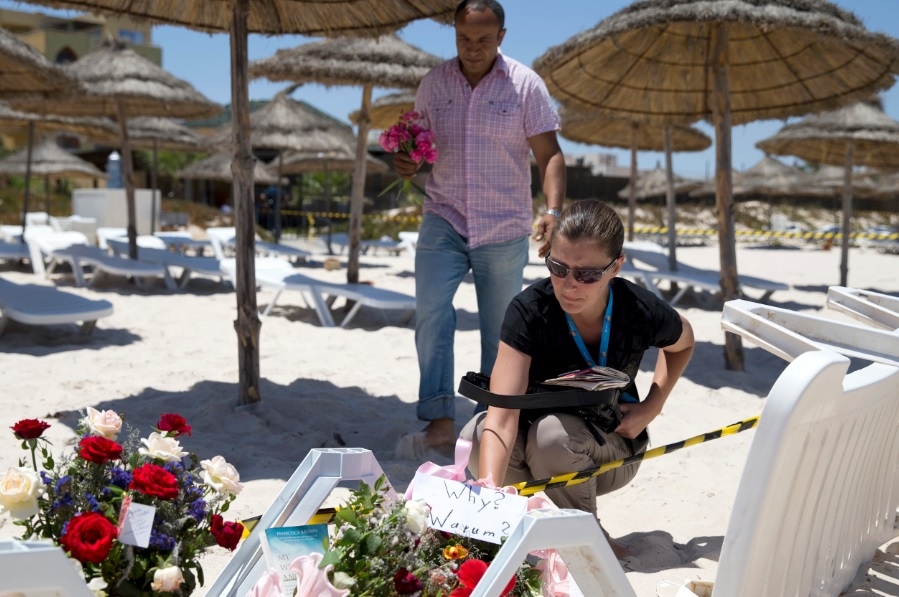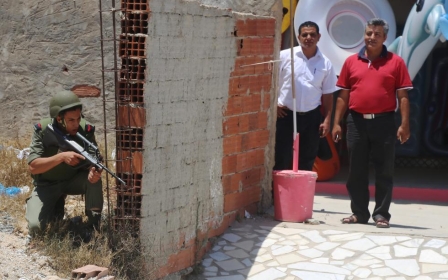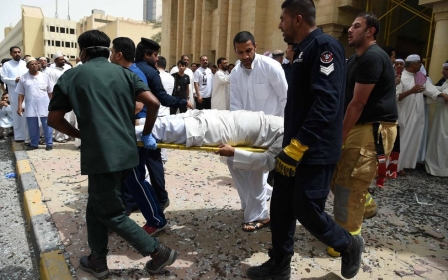Tunisia to shut 80 'unlicensed' mosques as IS claims attack

Tunisia will close down 80 mosques that were outside state control for allegedly inciting violence, Prime Minister Habib Essid announced on Friday, following a massacre in a Tunisian seaside resort that killed nearly 40 people, claimed by the Islamic State.
Dozens more were wounded when a man pulled a gun from inside a beach umbrella and opened fire on crowds of tourists at the five-star Riu Imperial Marhaba Hotel in the popular Mediterranean resort of Port el Kantaoui.
Essid said 38 people had been killed, revising down an earlier toll of 39 given by the health ministry. An official there told AFP the original figure had included the dead gunman.
Most of those killed were from Britain - implying this could be the biggest loss of British life in a militant attack since the July 2005 bombings in London when 52 died - while Germans, Belgians and French were also among the dead, the premier said.
IS said the gunman, who they identified as Abu Yahya al-Qayrawani, was a "soldier of the caliphate" who had targeted enemies of the militant group and "dens (of...) fornication, vice and apostasy".
Most of those killed were "subjects of states that make up the crusader alliance fighting the state of the caliphate", the group said in a statement released on Twitter, referring to the group of countries that have been bombarding its positions in the Middle East.
Tunisian Secretary of State for Security Rafik Chelly told Mosaique FM the gunman was a Tunisian student previously unknown to the authorities.
"He entered by the beach, dressed like someone who was going to swim, and he had a beach umbrella with his gun in it. Then when he came to the beach he used his weapon," Chelly said.
Witnesses at the scene
Witnesses described scenes of panic after the shooting at the hotel on the outskirts of Sousse, about 140 kilometres (90 miles) south of the capital Tunis.
"All I saw was a gun and an umbrella being dropped," British tourist Ellie Makin told ITV television.
"Then he started firing to the right-hand side of us. If he had fired to the left I don't know what would have happened, but we were very lucky."
The shooting was the worst in modern-day Tunisia and followed a March attack claimed by Islamic State on Tunis's Bardo National Museum that killed 21 foreign tourists and a policeman.
British tourist Gary Pine told Britain's Sky News television that Friday's attack happened when the beach was packed. He counted 20-30 shots.
"My son was in the sea at the time and of course my wife and myself were shouting for him to get out the sea quick and as we ran up the beach he said: 'I just saw someone get shot'."
Briton Olivia Leathley, 24, heard "loud bangs" and when she went to the lobby to find out what was happening, she saw a woman whose husband had "been shot in the stomach in front of her".
"All she said was that he'd been shot and that he was there bleeding on the beach and he was just saying, 'I love you, I love you', and then his eyes rolled back into his head."
Another woman described how her fiance was shot three times while trying to protect her and was in intensive care in hospital.
"I owe him my life because he threw himself in front of me when the shooting started," 26-year-old holidaymaker Saera Wilson told the BBC.
By the early hours of Saturday morning, hundreds of tourists were arriving at Enfidha airport in a mad scramble to leave the country, according to an AFP journalist on the scene.
New security measures
Essid on Saturday announced new anti-terrorism measures, including the deployment of reserve troops to reinforce security at "sensitive sites... and places that could be targets of terrorist attacks".
The "exceptional plan to better secure tourist and archaeological sites" will include "deploying armed tourist security officers all along the coast and inside hotels from 1 July," he added.
Tunisian President Beji Caid Essebsi told AFP that his country cannot stand up to the militant threat alone, and urged a unified global strategy.
In October 2013, a suicide bomber blew himself up in a botched attack on a Sousse beach while security forces foiled another planned attack nearby.
Even before the latest attack, Tunisia's tourism industry had been bracing for a heavy blow from the Bardo shooting, but was determined to attract tourists with new security measures and advertising.
Tourism accounts for seven percent of Tunisia's GDP and almost 400,000 direct and indirect jobs.
In Cairo, leading Sunni Muslim institution Al-Azhar called the "heinous" shooting a "violation of all religious and humanitarian norms".
Tourists scramble to leave Tunisia
Meanwhile, thousands of scared foreign holidaymakers were being flown from Tunisia on Saturday.
A heavy blow had already been delivered to the key tourism industry with British tour operator Thomas Cook announcing it would offer all customers the possibility to change bookings to Tunisia up to and including 24 July.
The Association of British Travel Agents said it was consulting with the Foreign Office about the longer term.
Eight Britons, one Belgian and one German have been identified among the 38 people killed, the Tunisian health ministry said on Saturday.
"Ten bodies have been identified out of 38 -- eight Britons, a Belgian and a German," said senior ministry official Naoufel Somrani.
Another 39 people were wounded including British, German and Belgian nationals.
The ministry said more time was needed to identify the other victims because most of them were in beachwear at the time of the attack and were not carrying identification.
British PM: 'terrorists will not succeed'
Meanwhile, British Prime Minister David Cameron on Saturday warned the country to prepare for the fact that "many" of those killed in the attack on a Tunisian beach resort were British.
"I'm afraid that the British public need to be prepared for the fact that many of those killed were British," Cameron said in a televised address from his Downing Street residence.
He added: "These were innocent holidaymakers, relaxing and enjoying time with their friends and families.
"These terrorists murdered them because the terrorists oppose people and countries who stand for peace tolerance and democracy wherever they are in the world. But these terrorists will not succeed," he said.
Middle East Eye propose une couverture et une analyse indépendantes et incomparables du Moyen-Orient, de l’Afrique du Nord et d’autres régions du monde. Pour en savoir plus sur la reprise de ce contenu et les frais qui s’appliquent, veuillez remplir ce formulaire [en anglais]. Pour en savoir plus sur MEE, cliquez ici [en anglais].




